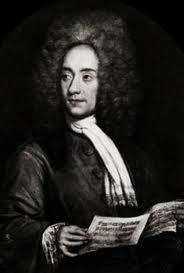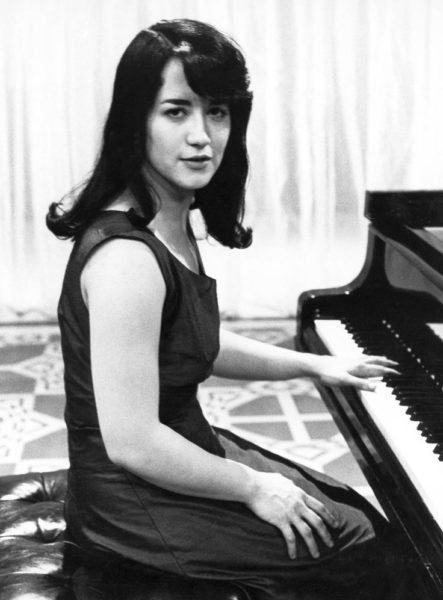June 4, 2018. Schumann, Albinoni, Argerich, Mravinsky.Robert Schumann, one of the greatest Romantic composers, was born on June 8th of 1810. We celebrate him often, and we’ve published several longer articles about Schumann’s wonderful song cycles, such as Dichterliebe (here and here), and Frauenliebe und -leben (here).So today we’ll just play some of his music.Here’s Schumann’s Kinderszenen, recorded by Martha Argerich in 1983.More about Ms. Argerich below.
Tomaso Albinoni is best remembered today for “Albinoni’s Adagio.”The problem is that at best this music is based on some fragment composed by Albinoni, but it likely has nothing to do with him at all: that is, at least, what Remo Giazotto, an Italian musicologist who “discovered” the piece, was claiming at the end of his life.But this controversy aside, Albinoni, who was born on June 8th of 1671, was a fine, if not necessarily a major, Baroque composer.A Venetian, Albinoni was, unlike so many of his colleagues, quite well-to-do: his father was a wealthy merchant.During his lifetime, Albinoni was known for his operas.He wrote at least 50 of them; Albinoni himself claimed that he composed more than 80.His first opera, Zenobia, was produced in Venice in 1694; his last, Artamene, almost half a century later, in 1741.Most of the scores were lost during the firebombing of Dresden at the end of WWI.Practically none of his operas are staged these days.His oboe concertos, on the other hand, are still very popular.Here, for example, is Albinoni’s Concerto for oboe and strings in D minor Op. 9, no. 2.Ensemble Il Fondamento is directed by the oboe soloist, Paul Dombrecht.
It’s hard to imagine that Martha Argerich will turn 77 tomorrow, she brings so much energy and youth to piano-playing: even though she doesn’t perform often, when she does she generates a thrill like nobody else – read, for example, a review of her October 2017 concert at Carnegie Hall. Argerich (her last name is pronounced Ar-khe-rich in Spanish, although American announcers usually pronounce it with a “g,” not “kh,” and make a mess of the last consonant) was born in Buenos Aires.She’s Catalan Spanish on her father’s side and Russian Jewish on the maternal side.Argerich started playing piano at the age of three and studied music in Buenos Aires till the age of 14, when her family moved to Europe.There among her teachers were Friedrich Gulda, Maria Curcio, Abbey Simon, and Nikita Magaloff.She also took several lessons with Arturo Benedetti Michelangeli.At the age of 16 she won two competitions in a row, the 1957 Geneva Competition and the Feruccio Busoni.In 1965, Argerich won the Chopin competition in Warsaw; her playing there caused a sensation. That year she made her US debut. Very soon she was acknowledged as one of the most exciting pianists of the generation.Her recital career was rather short: since the early 1980s she practically stopped appearing on stage solo, citing “loneliness,” but continued to play chamber music and piano concertos.Argerch often plays with the pianists Nelson Freire, her old friend, and Stephen Kovacevich,her former husband, the violinist Gidon Kremer and the cellist Mischa Maisky.Here’s another example of Martha Argerich’s art: Bach’s English Suite No. 2 BWV 807 in A minor.
Born on June 4th of 1903 in St.-Petersburg, Evgeny Mravinsky was probably the greatest Russian conductor of the 20th century.Last week we played Glinka’s Overture to Ruslan and Lyudmila with Mravinsky conducting the Leningrad Philharmonic.Mravinsky deserves a separate entry, and we’ll write one soon.
Schumann, Albinoni, Argerich, Mravinsky 2018
June 4, 2018. Schumann, Albinoni, Argerich, Mravinsky. Robert Schumann, one of the greatest Romantic composers, was born on June 8th of 1810. We celebrate him often, and we’ve published several longer articles about Schumann’s wonderful song cycles, such as Dichterliebe (here and here), and Frauenliebe und -leben (here). So today we’ll just play some of his music. Here’s Schumann’s Kinderszenen, recorded by Martha Argerich in 1983. More about Ms. Argerich below.
Tomaso Albinoni is best remembered today for “Albinoni’s Adagio.” The problem is that at best this music is based on some fragment composed by Albinoni, but it likely has nothing to do with him at all: that is, at least, what Remo Giazotto, an Italian musicologist who “discovered” the piece, was claiming at the end of his life. But this controversy aside, Albinoni, who was born on June 8th of 1671, was a fine, if not necessarily a major, Baroque composer. A Venetian, Albinoni was, unlike so many of his colleagues, quite well-to-do: his father was a wealthy merchant. During his lifetime, Albinoni was known for his operas. He wrote at least 50 of them; Albinoni himself claimed that he composed more than 80. His first opera, Zenobia, was produced in Venice in 1694; his last, Artamene, almost half a century later, in 1741. Most of the scores were lost during the firebombing of Dresden at the end of WWI. Practically none of his operas are staged these days. His oboe concertos, on the other hand, are still very popular. Here, for example, is Albinoni’s Concerto for oboe and strings in D minor Op. 9, no. 2. Ensemble Il Fondamento is directed by the oboe soloist, Paul Dombrecht.
this music is based on some fragment composed by Albinoni, but it likely has nothing to do with him at all: that is, at least, what Remo Giazotto, an Italian musicologist who “discovered” the piece, was claiming at the end of his life. But this controversy aside, Albinoni, who was born on June 8th of 1671, was a fine, if not necessarily a major, Baroque composer. A Venetian, Albinoni was, unlike so many of his colleagues, quite well-to-do: his father was a wealthy merchant. During his lifetime, Albinoni was known for his operas. He wrote at least 50 of them; Albinoni himself claimed that he composed more than 80. His first opera, Zenobia, was produced in Venice in 1694; his last, Artamene, almost half a century later, in 1741. Most of the scores were lost during the firebombing of Dresden at the end of WWI. Practically none of his operas are staged these days. His oboe concertos, on the other hand, are still very popular. Here, for example, is Albinoni’s Concerto for oboe and strings in D minor Op. 9, no. 2. Ensemble Il Fondamento is directed by the oboe soloist, Paul Dombrecht.
It’s hard to imagine that Martha Argerich will turn 77 tomorrow, she brings so much energy and youth to piano-playing: even though she doesn’t perform often, when she does she generates a thrill like nobody else – read, for example, a review of her October 2017 concert at Carnegie Hall. Argerich (her last name is pronounced Ar-khe-rich in Spanish, although American announcers usually pronounce it with a “g,” not “kh,” and make a mess of the last consonant) was born in Buenos Aires. She’s Catalan Spanish on her father’s side and Russian Jewish on the maternal side. Argerich started playing piano at the age of three and studied music in Buenos Aires till the age of 14, when her family moved to Europe. There among her teachers were Friedrich Gulda, Maria Curcio, Abbey Simon, and Nikita Magaloff. She also took several lessons with Arturo Benedetti Michelangeli. At the age of 16 she won two competitions in a row, the 1957 Geneva Competition and the Feruccio Busoni. In 1965, Argerich won the Chopin competition in Warsaw; her playing there caused a sensation. That year she made her US debut. Very soon she was acknowledged as one of the most exciting pianists of the generation. Her recital career was rather short: since the early 1980s she practically stopped appearing on stage solo, citing “loneliness,” but continued to play chamber music and piano concertos. Argerch often plays with the pianists Nelson Freire, her old friend, and Stephen Kovacevich,her former husband, the violinist Gidon Kremer and the cellist Mischa Maisky. Here’s another example of Martha Argerich’s art: Bach’s English Suite No. 2 BWV 807 in A minor.
thrill like nobody else – read, for example, a review of her October 2017 concert at Carnegie Hall. Argerich (her last name is pronounced Ar-khe-rich in Spanish, although American announcers usually pronounce it with a “g,” not “kh,” and make a mess of the last consonant) was born in Buenos Aires. She’s Catalan Spanish on her father’s side and Russian Jewish on the maternal side. Argerich started playing piano at the age of three and studied music in Buenos Aires till the age of 14, when her family moved to Europe. There among her teachers were Friedrich Gulda, Maria Curcio, Abbey Simon, and Nikita Magaloff. She also took several lessons with Arturo Benedetti Michelangeli. At the age of 16 she won two competitions in a row, the 1957 Geneva Competition and the Feruccio Busoni. In 1965, Argerich won the Chopin competition in Warsaw; her playing there caused a sensation. That year she made her US debut. Very soon she was acknowledged as one of the most exciting pianists of the generation. Her recital career was rather short: since the early 1980s she practically stopped appearing on stage solo, citing “loneliness,” but continued to play chamber music and piano concertos. Argerch often plays with the pianists Nelson Freire, her old friend, and Stephen Kovacevich,her former husband, the violinist Gidon Kremer and the cellist Mischa Maisky. Here’s another example of Martha Argerich’s art: Bach’s English Suite No. 2 BWV 807 in A minor.
Born on June 4th of 1903 in St.-Petersburg, Evgeny Mravinsky was probably the greatest Russian conductor of the 20th century. Last week we played Glinka’s Overture to Ruslan and Lyudmila with Mravinsky conducting the Leningrad Philharmonic. Mravinsky deserves a separate entry, and we’ll write one soon.